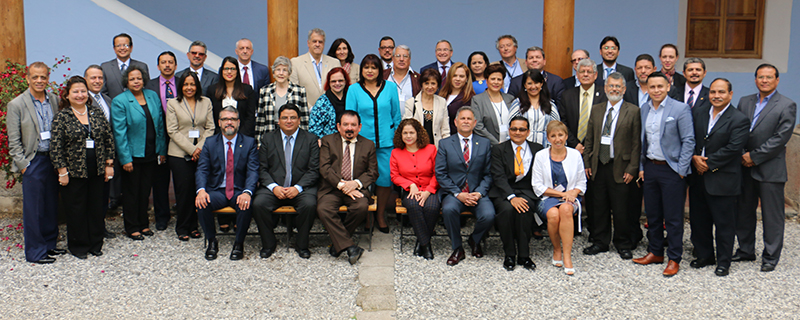On April 24 and 25, 2017, the Pan American Health Organization (PAHO/WHO), with the support of the Spanish Agency for the Development of International Cooperation (AECID) and the Central American Integration System (SICA), organized a sub-regional meeting in Antigua, Guatemala. The goal of the meeting was to prepare a proposal to develop knowledge management and human resources training centers focusing on improving public health policies in the Dominican Republic and Central America.
The two days of presentations and hard work of the discussion groups formed on the afternoon of April 25th were important to identify the priority lines of intervention on the topics of the event.
Participants were able to exchange knowledge among them and identify ways of mutual cooperation among the participating organizations to support decision making on Health Policies. The meeting was also a unique opportunity to present PAHO/WHO cooperation resources on knowledge management and research in health, providing greater visibility to the Virtual Campus for Public Health (CVSP), the Virtual Health Library (VHL), the Latin American and Caribbean Health Sciences Literature (LILACS), and other regional initiatives led by the area of Knowledge Management, Bioethics and Research (KBR) teams, including BIREME.
The PAHO/WHO Office in Brazil, through its Technical Unit of Human Resources in Health, together with BIREME, shared experiences on developing a project to identify and analyze scientific and technical information on human resources in health published during the last 20 years in the main international and regional indexes. The results of this project should help formulating a knowledge management strategy for the field of human resources in health at the regional level.
“The goal of the first stage of the project is to compile scientific and non-conventional literature in the field of human resources in health, which access is not easy to the whole region. The second stage will be the publication of this material in LILACS”, states Stella de Wit, a consultant at PAHO/WHO Brazil.
A preliminary analysis of the literature retrieved on the theme and indexed according to the Health Science Descriptors (DeCS) shows a high concentration of publications related to medical and nursing continuous education, nursing staff and in-service training. Moreover, it enables the identification of different aspects of these publications with an emphasis on organization and administration, which involves planning and directing programs, services and resources. It also shows the importance of grey literature in the infometrics analysis of human resources in health, indicating the need to strengthen the management of this type of literature in government and teaching organizations, through institutional repositories that can interoperate with LILACS.
“The goal is to guarantee access to quality and relevant literature so that scholars, managers and civil society can make better decisions. “At the end of the ‘Human Resources in Health decade’, occurred in 2015, we have to strengthen the progress made in this field and contribute to the continuous development nowadays” said Dr. Monica Padilla, Coordinator of the Unit of Human Resources in Health at PAHO/WHO Brazil.
The meeting had the participation of representatives from the Central American University Council; the Council of Ministers of Health of Central America; Academic Research and Graduate Centers of Public Universities and Schools of Medicine, Social Sciences, Political Sciences and Public Health, and Ministries of Health and extra regional institutions. For further information on the meeting, please visit the website of PAHO/WHO Central American Observatory of Human Resources in Health at Observatorio Centroamericano de Recursos Humanos de Salud de OPS/OMS.